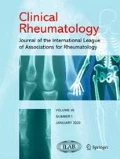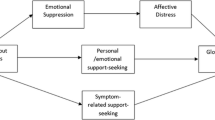Abstract
The aim of this study was to elucidate whether physicians’ illness perceptions correlate with their frustration or resistance to accepting patients with fibromyalgia (FM). In this cross-sectional postal survey, questionnaires were sent to member physicians of the Japan College of Rheumatology and Japan Rheumatism Foundation. Measures collected included the Brief Illness Perception Questionnaire with Causal Attribution, the Illness Invalidation Inventory, and the Difficult Doctor–Patient Relationship Questionnaire (DDPRQ-10). Multiple logistic regression was performed to examine associations between the DDPRQ-10 and resistance to accepting patients with FM for treatment. We analyzed data from 233 physicians who had experience in consulting with patients with FM. Only 44.2 % answered that they wanted to accept additional patients with FM. Physicians’ frustration was associated with difficulty controlling symptoms, patients’ emotional responses, and causal attribution of FM to patient internal factors. Conversely, lower levels of frustration were associated with causal attributions to biological factors and uncontrollable external factors. However, the “difficult patient” perception did not correlate with resistance to accepting patients with FM. Difficulty controlling symptoms with treatment was the one factor common to both physicians’ frustration and resistance to accepting patients with FM. Physicians may hesitate to accept patients with FM not because of the stigmatic image of the “difficult patient,” but instead because of the difficulty in controlling the symptoms of FM. Thus, to improve the quality of consultation, physicians must continuously receive new information about the treatments and causes of FM.
Similar content being viewed by others
References
Wolfe F, Smythe HA, Yunus MB, Bennett RM, Bombardier C, Goldenberg DL et al (1999) The American College of Rheumatology 1990 criteria for the classification of fibromyalgia. Report of the Multicenter Criteria Committee. Arthritis Rheum 33:160–172
Wolfe F (2003) Stop using the American College of Rheumatology criteria in the clinic. J Rheumatol 30:1671–1672
Wolfe F, Clauw DJ, Fitzcharles MA, Goldenberg DL, Katz RS, Mease P et al (2010) The American College of Rheumatology preliminary diagnostic criteria for fibromyalgia and measurement of symptom severity. Arthritis Care Res 62:600–610
Matsumoto Y, Maeda S, Tamakoshi A, Nishioka K (2005) Clinicoepidemiological study in Japanese fibromyalgia patients [article in Japanese]. In summary report of research on allergic disease and immunology, health labour sciences research grant. Tokyo, pp 156–158
Matsumoto Y (2007) Awareness of fibromyalgia in Japan and the validation of applicability of ACR (1990) criteria [article in Japanese]. In summary report of research on allergic disease and immunology, health labour sciences research grant. Tokyo, pp 43–45
Arshad A, Kong KO (1997) Awareness and perceptions of fibromyalgia syndrome: a survey of Southeast Asian rheumatologists. J Clin Rheumatol 13:59–62
Buskila D, Neumann L, Sibirski D, Shvartzman P (1997) Awareness of diagnostic and clinical features of fibromyalgia among family physicians. Fam Pract 14:238–241
Matsumoto Y (2011) Longitudinal study of change in awareness of fibromyalgia in Japan and the creation of clinical guideline [article in Japanese]. In summary report of research on allergic disease and immunology, health labour sciences research grant. Tokyo, pp 27–29
Åsbring P, Närvänen AL (2003) Ideal versus reality: physicians perspectives on patients with chronic fatigue syndrome (CFS) and fibromyalgia. Soc Sci Med 57:711–720
Hahn SR, Thompson KS, Wills TA, Stern V, Budner NS (1994) The difficult doctor-patient relationship: somatization, personality and psychopathology. J Clin Epidemiol 47:647–657
Hinchey SA, Jackson JL (2011) A cohort study assessing difficult patient encounters in a walk-in primary care clinic, predictors and outcomes. J Gen Intern Med 26:588–594
Walker EA, Katon WJ, Keegan D, Gardner G, Sullivan M (1997) Predictors of physician frustration in the care of patients with rheumatological complaints. Gen Hosp Psychiatry 19:315–323
Hahn SR (2001) Physical symptoms and physician-experienced difficulty in the physician-patient relationship. Ann Intern Med 134:897–904
Album D, Westin S (2008) Do diseases have a prestige hierarchy? A survey among physicians and medical students. Soc Sci Med 66:182–188
Leventhal H, Cameron L (1987) Behavioral theories and the problem of compliance. Patient Educ Couns 10:117–138
Leventhal H, Diefenbach M, Leventhal EA (1992) Illness cognition—using common-sense to understand treatment adrerence and affect cognition interactions. Cogn Ther Res 16:143–163
Hagger MS, Orbell S (2003) A meta-analytic review of the common-sense model of illness representations. Psychol Health 18:141–184
Grayson PC, Amudala NA, McAlear CA, Leduc RL, Shereff D, Richesson R et al (2013) Illness perceptions and fatigue in systemic vasculitis. Arthritis Care Res 65:1835–1843
Giri P, Poole J, Nightingale P, Robertson A (2009) Perceptions of illness and their impact on sickness absence. Occup Med (Lond) 59:550–555
Sultan S, Attali C, Gilberg S, Zenasni F, Hartemann A (2011) Physicians’ understanding of patients’ personal representations of their diabetes: accuracy and association with self-care. Psychol Health 26:101–117
Pastor MA, López-Roig S, Johnston M, Gracia R, Daza P (2012) Clinical self-efficacy and illness beliefs in ambiguous chronic pain conditions: general practitioners management of fibromyalgia. Anales de Psicología 28:417–425
Wild D, Grove A, Martin M et al (2005) Principles of good practice for the translation and cultural adaptation process for patient-reported outcomes (PRO) measures: report of the ISPOR Task Force for Translation and Cultural Adaptation. Value Health 8:94–104
Broadbent E, Petrie KJ, Main J, Weinman J (2006) The brief illness perception questionnaire. J Psychosom Res 60:631–637
Weinman J, Petrie KJ, MossMorris R, Horne R (1996) The illness perception questionnaire: a new method for assessing the cognitive representation of illness. Psychol Health 11:431–445
Moss-Morris R, Weinman J, Petrie K, Horne R, Cameron L, Buick D (2002) The Revised Illness Perception Questionnaire (IPQ-R). Psychol Health 17:1–16
University of Bergen (2013) The Illness Perception Questionnaire. [Online] http://www.uib.no/ipq. Accessed 1 Feb 2014
Frostholm L, Fink P, Oernboel E, Christensen KS, Toft T, Olesen F et al (2005) The uncertain consultation and patient satisfaction: the impact of patients’ illness perceptions and a randomized controlled trial on the training of physicians’ communication skills. Psychosom Med 67:897–905
Frostholm L, Fink P, Christensen KS, Toft T, Oernboel E, Olesen F et al (2005) The patients’ illness perceptions and the use of primary health care. Psychosom Med 67:997–1005
van Ittersum MW, van Wilgen CP, Hilberdink WK, Groothoff JW, van der Schans CP (2009) Illness perceptions in patients with fibromyalgia. Patient Educ Couns 74:53–60
Kool MB, van Middendorp H, Lumley MA, Schenk Y, Jacobs JW, Bijlsma JW et al (2010) Lack of understanding in fibromyalgia and rheumatoid arthritis: the Illness Invalidation Inventory (3*I). Ann Rheum Dis 69:1990–1995
Kool MB, van Middendorp H, Boeije HR, Geenen R (2009) Understanding the lack of understanding: invalidation from the perspective of the patient with fibromyalgia. Arthritis Rheum 61:1650–1656
Hahn SR, Kroenke K, Spitzer RL, Brody D, Williams JB, Linzer M et al (1996) The difficult patient: prevalence, psychopathology, and functional impairment. J Gen Intern Med 11:1–8
Peduzzi P, Concato J, Kemper E, Holford TR, Feinstein AR (1996) A simulation study of the number of events per variable in logistic regression analysis. J Clin Epidemiol 49:1373–1379
Murakami M Matsuno T, Koike K (2004) Establishing disease concept based on the fibromyalgia: survey on awareness toward fibromyalgia by psychosomatic physicians [article in Japanese]. In summary report of research on allergic disease and immunology, health labour sciences research grant. Tokyo, pp 100–104
Groves JE (1978) Taking care of the hateful patient. N Engl J Med 298:883–887
Looper KJ, Kirmayer LJ (2004) Perceived stigma in functional somatic syndromes and comparable medical conditions. J Psychosom Res 57:373–378
Dimsdale J, Sharma N, Sharpe M (2011) What do physicians think of somatoform disorders? Psychosomatics 52:154–159
Acknowledgments
This study was supported by a Grant-in-Aid for Japan Society for the Promotion of Science Fellows during the fiscal years of 2010–2012. We thank all of the participants in this study and the members of the Department of Health Communication at The University of Tokyo.
Disclosures
Mieko Homma, Hirono Ishikawa, and Takahiro Kiuchi report no disclosures.
Author information
Authors and Affiliations
Corresponding author
Rights and permissions
About this article
Cite this article
Homma, M., Ishikawa, H. & Kiuchi, T. Association of physicians’ illness perception of fibromyalgia with frustration and resistance to accepting patients: a cross-sectional study. Clin Rheumatol 35, 1019–1027 (2016). https://doi.org/10.1007/s10067-014-2752-6
Received:
Revised:
Accepted:
Published:
Issue Date:
DOI: https://doi.org/10.1007/s10067-014-2752-6




